Iranian-Backed Forces Withdrawing From Bombed Syrian Areas
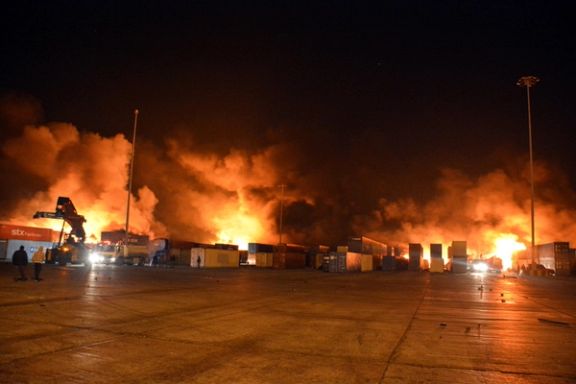
Israeli military says Hezbollah and other Iran-backed militia groups are withdrawing from areas in Syria that were targeted by Israel in recent months.

Israeli military says Hezbollah and other Iran-backed militia groups are withdrawing from areas in Syria that were targeted by Israel in recent months.
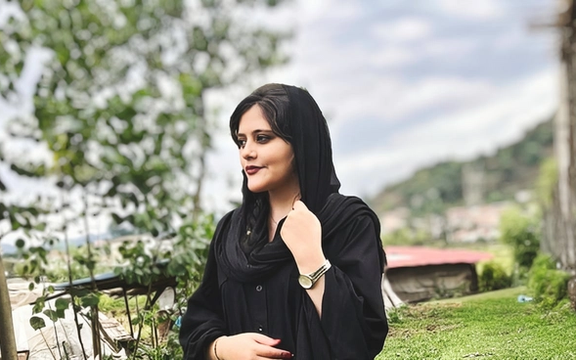
A young woman who had received a severe head injury in the custody of Iran's hijab police, died on Friday, further enraging Iranians who flooded social media.
Social media posts with the hashtag ‘Mahsa Amini’ have continued to be retweeted and liked thousands of times since Wednesday when it was revealed that she had been taken to hospital from a detention center in northern Tehran only two hours after her arrest and was in a coma. Authorities deny any violence against Amini while she was in custody.
A photo of the 22-year-old Mahsa Amini on the hospital bed shows her unconscious with very clear signs of bleeding from her right ear. Several doctors including Mahdiar Saeedian, editor of a health magazine, have pointed out on social media that brain strokes do not cause otorrhagia (hemorrhage from ears) which proves that her coma was caused by trauma to the head.
The young girl – originally from Saqqez in Kurdistan province -- was arrested in her brother’s car on a visit to the capital to see their relatives by hijab enforcement officers. The morality or Islamic religious police told her brother she was being taken to the detention center for a brief admonitory session about the Islamic dress code, hijab, and would be released soon after.
Iran’s government which is now fully controlled by hardliners has adopted a harsher than usual approach amid economic crisis and hardship for tens of millions. Government and military officials have warned the population against disobeying hijab rules and hijab enforcement patrols have detained many women, sometimes violently, on the streets.
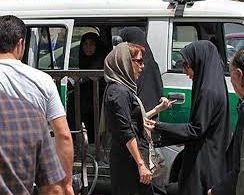
Hijab patrols have increased on the streets in recent months and videos of violent arrests of women and teenage girls as well as confrontations between people and hijab enforcers arevfrequently posted.
Many social media users have also pointed out that when George Floyd was killed because of police violence in the United States, in a televised speech Iran’s leader Ali Khamenei called it a “brutal” act that exposed “the true nature of the rulers of the United States.”
“The Islamic Republic never pays the cost of its brutality. Where are those [hardliners] now who lit black candles for George Floyd and made the hashtag ‘I can't breathe’ trending [in Persian social media],” one of the tweets retweeted hundreds of times asked.
Khamenei has always expressed support for strict hijab enforcement. In a speech in July, he alleged that Iranian women’s anti-hijab movement is nothing but a Western plot. The speech was made ten days after an anti-hijab protester identified as 28-year-old writer Sepideh Rashno was arrested in Tehran after an encounter with a hijab enforcer on a city bus.
Social media users have also highlighted the deaths in custody of other ordinary people and activists, including women's rights activist Haleh Sahabi in 2011, blogger Sattar Beheshti in 2012, Iranian-Canadian environmentalist Kavous Seyed-Emami in 2018, andZahra Bani-Yaghoub, a medical doctor who died in prison in 2007 after being arrested by the morality police. Iranian authorities attributed all these deaths in custody to strokes without taking any responsibility for them despite undeniable evidence of violence.
“Sattar Beheshti had a ‘stroke’. Haleh Sahabi had a ‘stroke’. Kavous Seyed-Emami had a ‘stroke’. Nobody gets killed by beating in the Islamic Republic,” another very popular tweet said.
Several Iranian celebrities including outspoken former national team soccer player Ali Karimiwho has nearly ten million followers on Instagram have posted about the young woman's tragic fate on social media. American actress and author Leah Remini’s tweet about the incident has also drawn much attention to Amini’s case and state violence against Iranian women for hijab.

Iranian President Ebrahim Raisi said on Friday that the Shanghai Cooperation Organization (SCO) can help thwart “US unilateralism” and solve the problems created by sanctions.
Raisi made the remarks during his meeting with his Chinese counterpart Xi Jinping on the sidelines of the SCO summit in the Uzbek city of Samarkand on Friday, adding that "the Islamic Republic has not been and won't be stopped despite all the enmities, and will not give up in the face of US' bullying."
During the summit, he reiterated that foiling "draconian" US sanctions required new solutions, stressing the need for expanding the central Asian security organization.
Raisi also called for expanding free trade among SCO member countries, alongside financial and banking cooperation, noting that Tehran and Beijing have enormous capacities in the fields of oil and energy, transit, agriculture, and trade.
Xi, for his part, pointed out that the longstanding friendship of China and Iran have stood the test of a changing international landscape, adding that their common strategic choice is consolidating and growing their comprehensive partnership.
The two sides should make active efforts to implement their 25-year comprehensive cooperation plan, advance China’s Belt and Road initiative -- a global infrastructure development strategy by the Chinese government to invest in various countries -- and strive for more deliverables of cooperation, Xinhua quoted Xi as saying.
Tehran, which seeks to overcome economic isolation imposed by US sanctions, on Thursday signed a memorandum of obligations to become a permanent member of the SCO, formed in 2001 as a talking shop for Russia, China and ex-Soviet states in Central Asia, and expanded four years ago to include India and Pakistan.
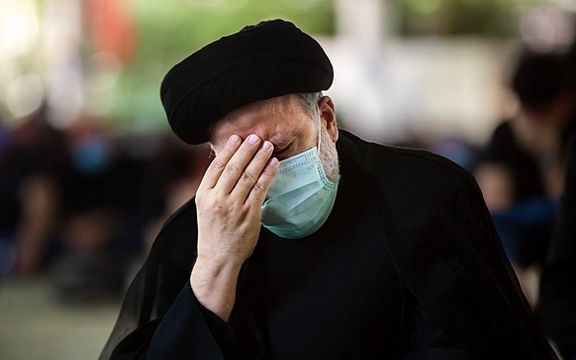
Days before Iran’s president is scheduled to attend the UN General Assembly, three former prisoners in Iran are launching a civil lawsuit against him in New York.
The hardliner president Ebrahim Raisi’s scheduled trip to the United States, together with a large entourage, has been the subject of controversy. Human rights activists, Iranian dissidents, former political prisoners and hostages in Iran have urged the Biden administration not to issue a visa to Raisi.
Raisi served as Iran’s Judiciary chief before becoming president in August 2021, but he spent most of life in the Islamic judiciary and is accused by human rights groups of taking part in gross violations of human rights. He was a member of a death committee that ordered the killing of thousands of political prisoners in 1988, an involvement he has proudly admitted.
The US sanctioned him, along with other Iranian officials in 2019 for human rights violations.
A former prisoner in Iran, Mehdi Hajati and two former hostages, Hamid Babaei and Australian-British academic Kylie Moore-Gilbert, who was held hostage for two years in Iran announced Thursday that they will launch a civil lawsuit.
The National Union for Democracy in Iran (NUFDI), an American Iranian advocacy group is assisting the plaintiffs in their legal action. NUFDI said in a statement that human rights attorney Shahin Milani will represent the three plaintiffs.
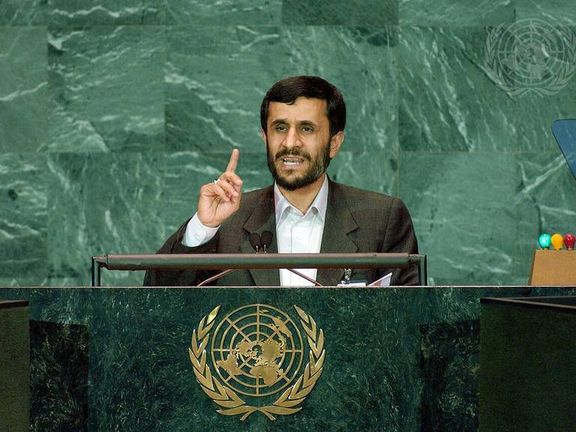
Mehdi Hajati was an elected local official in the Iranian city of Shiraz who was sentenced to prison for his defense of the persecuted Baha’i community in 2019. Hamid Babaei, a resident of Belgium was also held hostage in Iran.
Moore-Gilbert, a lecturer in Islamic studies at the University of Melbourne was arrested on bogus charges in Iran in September 2018 and held until November 2020, when she was exchanged with Iranians jailed in Thailand on terrorism convictions. They received a hero’s welcome upon their return to Iran.
A bipartisan group of 52 US lawmakers urged President Joe Biden on September 9 to deny visas for Raisi and his delegation.
"The United States cannot overlook Ebrahim Raisi’s direct involvement in gross violations of internationally recognized human rights, including the 1988 organized mass murder of thousands of political prisoners, among whom were women and children, by the Iranian regime,” the lawmakers wrote to Biden.
So far the Biden Administration appears to be determined to issue the visas, arguing that it is legally obligated as host nation of the United Nations to allow officials of other government to conduct their UN business in New York.
Critics who urge a visa denial say that “As the host country for UN headquarters, the United States has a general obligation to grant visas to those conducting UN business. However, as lawmakers noted in their letters to Biden, U.S. law authorizes a denial of visas to individuals responsible for torture and extrajudicial killings.” They cite the example of Austrian President Kurt Waldheim who was denied entry into the US in 1987 for his responsibility for the persecution of Jews and others during World War II.
Iranian Americans have organized a protest outside the UN headquarters in New York City on September 21, the day Raisi is scheduled to speak at the General Assembly and at the same time NUFDI will unveil the details of the lawsuit against him.
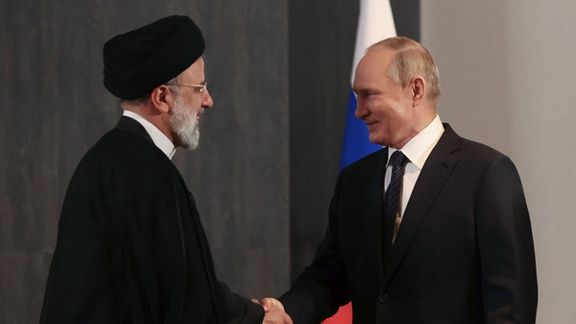
Relations between Tehran and Moscow are strategic and Tehran aims to boost ties at all levels, Iran's president said Thursday in a meeting with Vladimir Putin.
On the sidelines of the Shanghai Cooperation Organization (SCO) summit in the Uzbek city of Samarkand Thursday,President Ebrahim Raisi assured his Russian counterpartthat Tehran will never recognize the sanctions against Russia and will strengthen and develop its trade and economic relations with Moscow.
“Our relations are not ordinary; they are of a strategic nature. Iran wishes to expand its strategic relations with Russia and all political, economic, trade, and aerospace areas,” he told the Russian President. Raisi Also stressed that Tehran- Moscow cooperation can “neutralize” the effects of US sanctions on both countries.
President Raisi and his government consider relations with Moscow and Beijing and Iran’s full membership in SCO a powerful tool in overcoming US sanctions and their effects which have hugely affected the Iranian economy since 2018 when former US President Donald Trump pulled out of the 2015 nuclear agreement (JCPOA) and slapped crippling sanctions on the country.
"The relationship between countries that are sanctioned by the US, such as Iran, Russia or other countries, can overcome many problems and issues and make them stronger," Raisi told Putin in the meeting.
"The Americans think whichever country they impose sanctions on, it will be stopped, their perception is a wrong one."
That is exactly what critics of the Biden Administration policy of reviving the JCPOA argue. Freeing Iran from US sanctions will open a back door for Russia to violate Western sanctions imposed on its energy exports and international banking. Already the two countries have deals for natural gas and oil swaps, which can help disguise Russian energy exports.
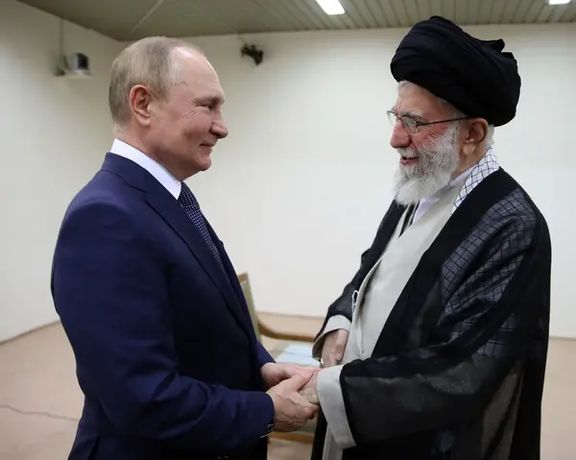
Iran has also supported Russia's invasion of Ukraine and has delivered military drones to Moscow. Recent images from Ukraine show Iranian suicide drones being used in the war.
For his part, Putin announced in the meeting that a Russian delegation of 80 large companies are to visit Tehran next week now that Iran has signed documents pertaining to full membership in SCO.
The Russian President said Tehran and Moscow actively cooperate on the international arena and their positions “coincide” on many issues. He added that many joint projects are moving forward “thanks to Supreme Leader Ali Khamenei’s support.” “We are interested in his further support,” he said.
Referring to Iran’s membership in SCO, Iranian foreign ministry spokesman Nasser Kanaani said in a tweet Wednesday that Iran “acts dynamically, intelligently and balanced in realizing the strategic goals of its foreign policy and expanding its foreign relations” but “does not wait for the JCPOA and the return of the United States to its JCPOA commitment” despite adhering to the talks for the restoration of the deal.
The SCO summit which brings together leaders of China, Russia, India, Pakistan and four ex-Soviet Central Asian countries together will ends on Friday. The Eurasian political, economic and security organization was founded by China, Russia, and four former Soviet republics in 2001 and has since expanded its membership to include India and Pakistan.
SCO approved Iran's application for accession last year at a conference in Dushanbe, Tajikistan, in September after many years of a slow process.
In a tweet Wednesday, Foreign Minister Hossein Amir-Abdollahian who is accompanying the president said he had signed a memorandum of commitments to join the organization as a full member, calling a "new phase" of economic, trade, transit, energy, and other cooperation with the body.
According to SCO deputy secretary-general Grigory Logvinov, it may take some time for Iran to complete the accession procedure.
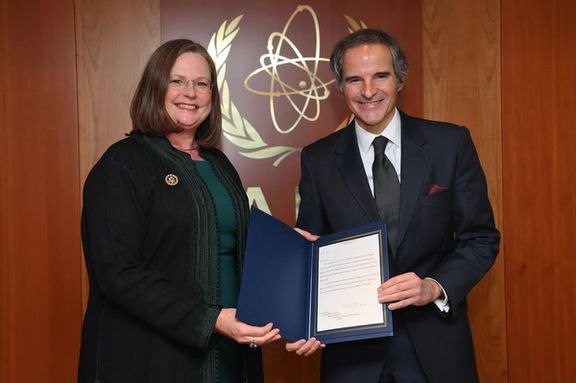
The US Mission to the UN has reiterated that Iran must provide technically credible explanations for the presence of uranium particles detected at three undeclared locations.
“The United States expresses our sincere appreciation for the continued professional and impartial efforts of the Agency [IAEA] to implement Iran’s Comprehensive Safeguards Agreement,” read the US Statement as delivered by Laura S.H. Holgate, the US envoy to international organizations in Vienna on Wednesday.
“We commend the Director General for his extensive efforts to engage Iran on the need to clarify and resolve the Agency’s longstanding concerns related to the presence of uranium particles of anthropogenic origin at three undeclared locations in Iran – Turquzabad, Varamin, and Marivan,” it added.
Emphasizing that “the path towards clarifying and resolving these issues is neither complicated nor never-ending,” the US mission said Iran must inform the IAEA about the current location of the detected nuclear material and/or contaminated equipment.” “The power to resolve these issues is in Iran’s hands.”
On Thursday, Rep. Claudia Tenney (D-NY) said that a resolution to demand documents from the Biden Administration related to nuclear talks with Iran failed to pass the House Foreign Affairs Committee.
“This morning…Democrats blocked efforts to pass resolutions of inquiry (also known as an ROI) to require the Biden Administration to turn over documents related to the Afghanistan withdrawal as well as ongoing nuclear talks with Iran.”
“Instead, House Democrats on the Foreign Affairs Committee prevented both the Afghanistan and Iran requests from moving forward. It was a shameful abdication of their oversight responsibilities to the American people,” she added.
A senior Israel Defense Forces officer said on Thursday that the apparent withdrawal of these forces from some regions is “a result of the IDF strikes” in recent weeks. He did not say which parts of Syria he was referring to.
Israeli defense officials have made such claims before, most recently in 2020.
The withdrawal of the forces detected by the IDF comes after the Saudi-owned London-based newspaper Asharq Al-Awsat reported that Russian officials have asked the Iranians to leave several sites in Syria, including its military headquarters in the western Hama province, situated next to the Syrian army’s Regiment 49 base. The Regiment 49 site is one of the most important military sites in western Hama as it houses long-range S-200 missiles and other Russian-made military equipment.
According to the report, Russia’s call was meant to deprive Israelis of excuses or pretexts to continue the bombing of targets where Russian forces are present.
“The Russian officers also demanded that the Iranians evacuate a second military site in the Hamidiya area, south of Tartus governorate on the Syrian coast,” a source told the paper.
Israel has intensified strikes on Syrian airports to disrupt Tehran's increasing use of aerial supply lines to deliver arms to allies in Syria and Lebanon including Hezbollah.
Israel conducted several airstrikes against the Aleppo International Airport in northwestern Syria, hours before its missiles struck targets southeast of capital Damascus on August 31.